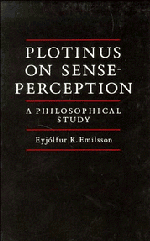Book contents
- Frontmatter
- Contents
- Acknowledgements
- Introduction
- I Plotinus' metaphysics
- II Plotinus' views on the soul and man
- III The relation between the eye and the object of vision
- IV Sensory affection
- V The unity of the senses
- VI The objects of perception
- VII Perceptions as acts and forms in perception
- VIII Conclusions
- Abbreviations
- Notes
- Bibliography
- Index
- Frontmatter
- Contents
- Acknowledgements
- Introduction
- I Plotinus' metaphysics
- II Plotinus' views on the soul and man
- III The relation between the eye and the object of vision
- IV Sensory affection
- V The unity of the senses
- VI The objects of perception
- VII Perceptions as acts and forms in perception
- VIII Conclusions
- Abbreviations
- Notes
- Bibliography
- Index
Summary
The merest glance at a list of the treatises of the Enneads, or at an index verborum, is sufficient to show that Plotinus took a great interest in sense-perception. Three treatises deal specifically with questions relating to perception, and remarks of varying lengths about perception are to be found throughout the Enneads. A philosophically-minded person who bothers to look at some of these passages is bound to find statements and arguments that evoke his curiosity.
Nevertheless, very little has been written about Plotinus' views on perception; none of the classic Plotinian studies, for example, discusses them in any detail. Presumably the main reason for this is that among Plotinian scholars there has been a strong tendency to focus on those aspects of Plotinus' philosophy that are of theological or religious interest; hence, other subjects have tended to receive less attention than they deserve. In any event I shall deal, in the present work, with the subject of sense-perception in Plotinus. In what follows I shall give some account of the nature of this undertaking.
The Enneads are held to be unusually difficult to read, even among philosophical works. Indeed it takes considerable effort to acquire sufficient feeling for Plotinus' thought, so as not to be lost most of the time. One – and perhaps the most important – reason for this is the nature of the composition of the Enneads: they are a collection of treatises intended for circulation in Plotinus' school and not for publication.
- Type
- Chapter
- Information
- Plotinus on Sense-PerceptionA Philosophical Study, pp. 1 - 9Publisher: Cambridge University PressPrint publication year: 1988



